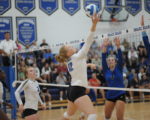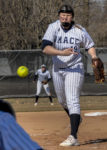
During her time at DMACC, sophomore Peyton Parker decided to play both softball and volleyball. Photo courtesy DMACC Athletics and Patty Harrison

The National Junior College Athletics Association (NJCAA) recognizes 23,000 female athletes playing on more than 1,500 sports teams across America. These days athletes hear what gets them to the collegiate level is ‘specialization,’ focusing on just one sport year-round as early as 8 years of age. A refreshing change to that way of thinking is sophomore Peyton Parker, a two-sport athlete at DMACC.
“For DMACC, the volleyball team recruited me first,” Parker said. “I took a visit here, then I decided I didn’t want to just play volleyball, I wanted to play softball too, and the coaches said that would work.”
Parker only seriously considered the few schools that were willing to let her play multiple sports, and DMACC led that list. Parker was a three sport varsity athlete at Union High School in Union, Iowa, earning letters in basketball, softball, and volleyball. In volleyball Parker led Iowa class 3A in service aces and ranked fourth in kills per set, which garnered a lot of attention from local schools.
“Softball has always been my main sport . . . I’ve been playing since about fourth grade. Softball just came naturally, that’s why I like it more [than volleyball].”
That doesn’t mean that Parker isn’t proud of her volleyball accomplishments, just the opposite.
“[I’m most proud of] volleyball . . . I had to work at it a lot more than softball, so I feel it’s a lot more rewarding for the success.”
Her success was acknowledged in 2018 when Parker was named to the All-Conference and All-Region volleyball teams after helping DMACC to a 23-12 record. She was also named to the All-Region Academic team and to the NJCAA Academic Third team for hard work in the classroom, where she is working toward a business administration degree.
Parker said she has no offseason, she goes from volleyball playoffs right into winter offseason workouts for softball, then the softball season through the end of the spring semester.
“I probably don’t have time [for a part-time job] because nights are the only time I have for schoolwork.”
Parker said she is glad she chose DMACC because of how the school and teachers support their athletes.
“[My teachers] are very accommodating, they help us if we miss class . . . DMACC helped me a lot.”
“In volleyball we did have to miss class some Fridays in the fall for weekend tournaments. For softball, most of our games are on weekends, we don’t miss that much class.”
Although softball is her favorite sport, Parker said she felt she had to assert herself more on the softball team than the volleyball team that she was originally recruited for.
“With volleyball, I knew my spot right away, my role and where I belonged on the team. In softball . . . everyday you had to come to practice to compete for a spot to play in the games.”
The DMACC Bears are a nationally recognized softball program with 3 finishes in the NJCAA World Series Final Four, six consecutive World Series appearances, and many players that move on to play Division 1 or Division 2 softball. With so much competition for spots Parker said being in both sports made her work harder than she might have if only in softball.
“There’s so much more competition for spots,” Parker said about the softball team, “I knew I had to work much harder [after volleyball].”
In Parker’s freshman year, the Bears softball team finished third in the NJCAA World Series with a 48-2 record that included an undefeated 28 in-conference wins, and regional and district champions. Parker was awarded 1st Team Academic All-Region and NJCAA All-Academic 3rd Team on last year’s squad.
“[All the players] came here to play softball at the highest level, we’re all really supportive of each other. It’s a lot of fun to play every game because we all have the same goal to win nationals.”
USA Today reports that compared to athletes specializing in one sport, multi-sport high school athletes experience less overuse injuries, feel less pressure and burnout of their sport, experience more long-term sports success, and have a higher chance to be active adults.
“At a smaller school [like Union] I feel it’s more common for a lot of the athletes to be in three or four sports, we’re exposed to more and not forced to choose.”
Parker has started seven games this spring as a pitcher for the Bears, recording five wins for the 27-4 Bears. Although she might only be a single sport athlete this fall depending on her university choice, Parker knows that being a multi-sport athlete has helped her reach this point.




Comments